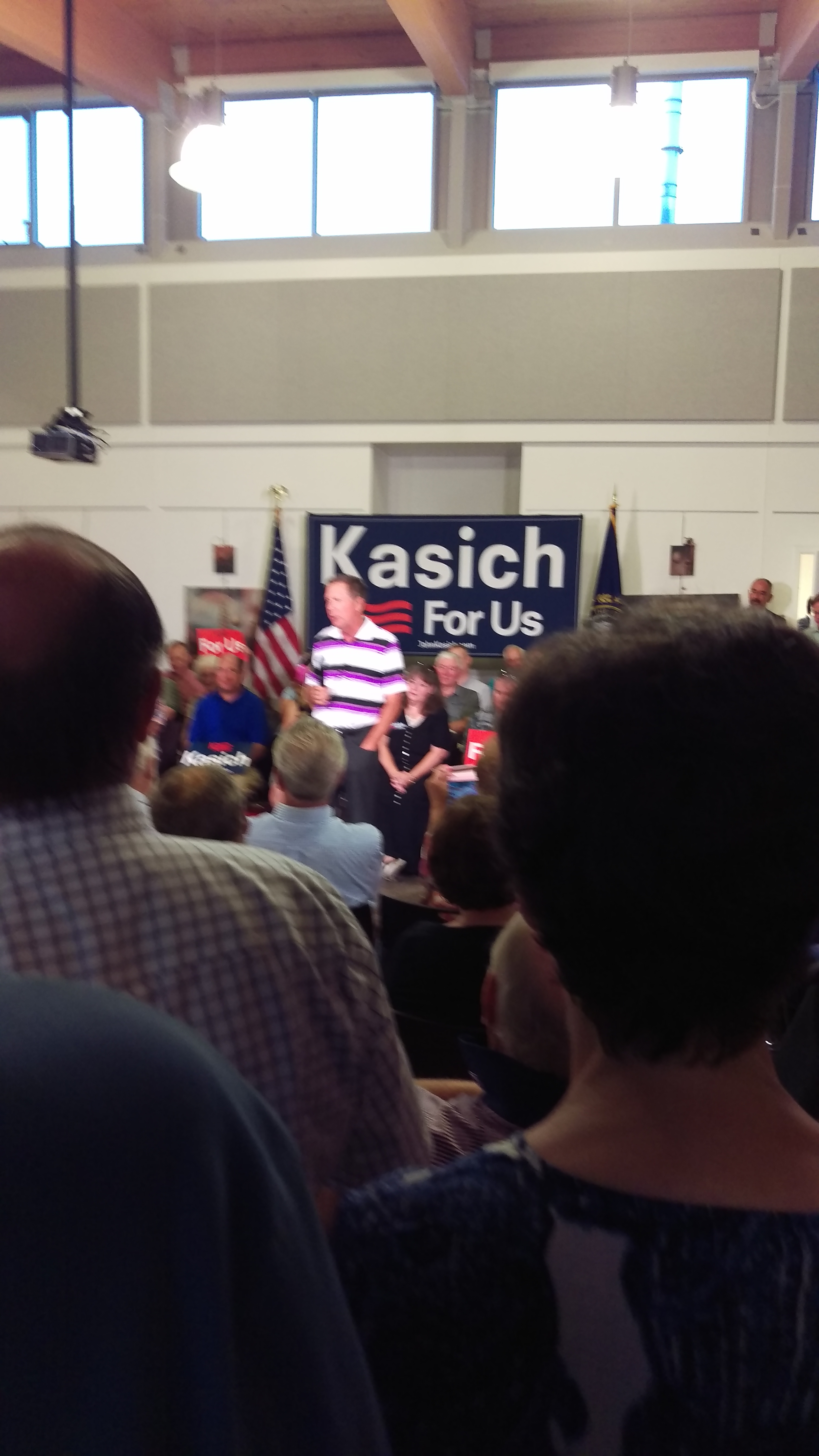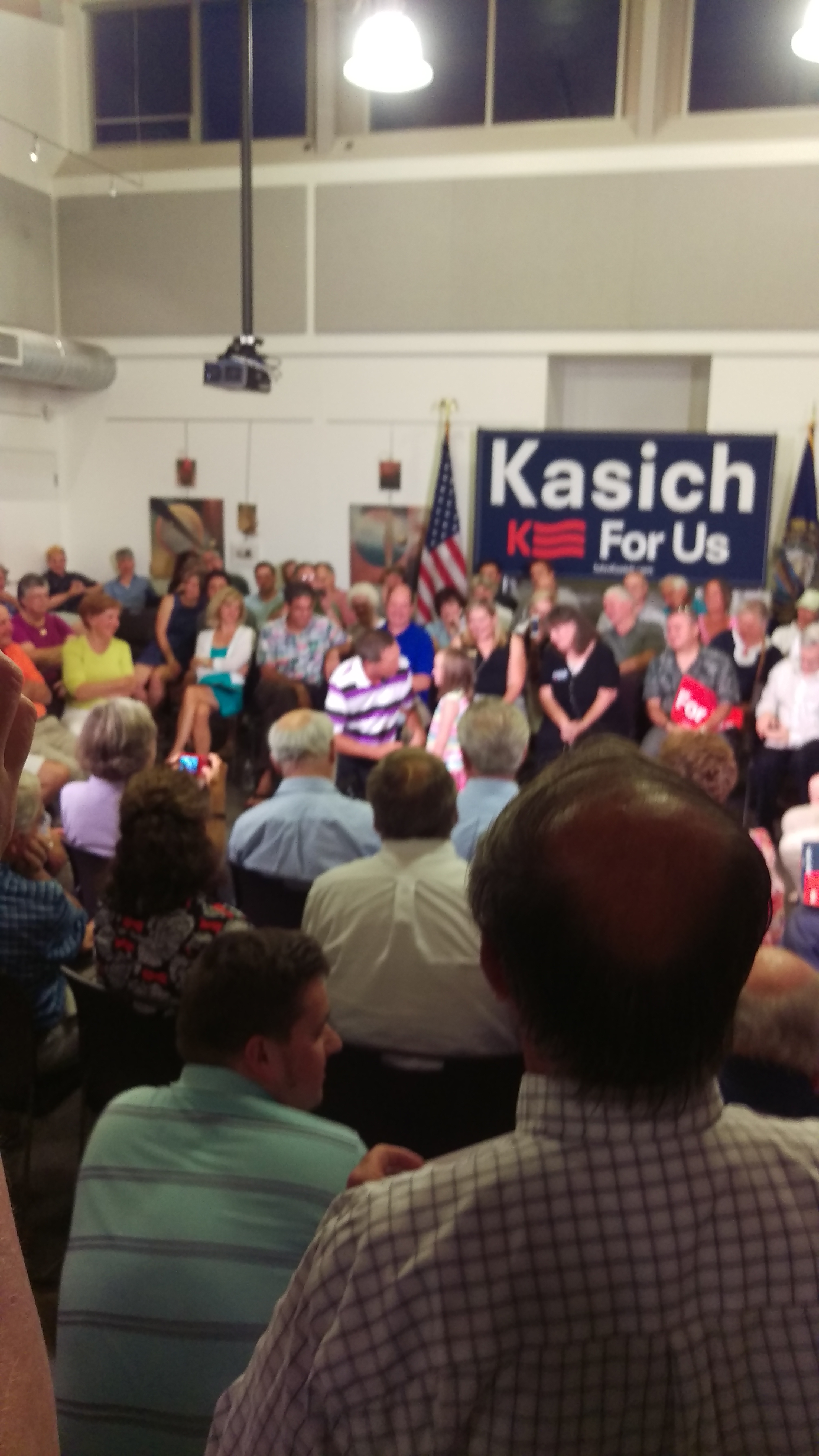Because I’ll be making a last round of New Hampshire campaign events tomorrow (I’m hoping to hit Cruz and Jeb! and will be live tweeting both events), I thought I’d post my assessment of the state of the Republican race in New Hampshire tonight. (The Democratic race, to me, has not been nearly as unpredictable.) As regular readers know, I’ve been fortunate to attend (and blog about) events held by every one of the Republican candidates so far (Lindsey – we hardly knew ye!) except for Cruz and Carson. (That includes Graham and Pataki – and I was witness to a “Where’s Jim Gilmore?” no show!) Drawing on those experiences, here are my thoughts on the likely state of the race today.
As I predicted last night, there has been what I believe to be a media overreaction to Rubio’s admittedly subpar debate performance last night. While I understand the chattering class’ need to create a newsworthy moment from every debate, my sense is that Rubio’s shell-shocked initial response to Christie’s heavy-handed attack (I thought Rubio recovered and finished the debate on the upswing) won’t have nearly the impact on his support in New Hampshire as some seem to believe. This is because I thought he had already plateaued before last night’s debate took place. Although his events are well attended, Marco’s brand of social conservatism doesn’t play very well among many New Hampshire voters. The most recent Monmouth poll finds that 55% of likely Republican voters surveyed say a candidate who shares their values is more important than electability when deciding how to vote. Unfortunately for Rubio, he has greater support among likely voters focused on electability (22%) rather than shared values (9%). Remember, Mike Huckabee received only 11% support in New Hampshire in 2008, and Rick Santorum did even worse, at 9% in 2012. Both were social conservatives coming off victories in Iowa. So while I expected that Rubio might get a momentary bump due to the media overreaction to his middling performance in Iowa, I didn’t think there would be any sustained Rubio surge in NH. This won’t stop pundits from claiming that Rubio’s debate performance caused his poll numbers to stall. Don’t get me wrong – Rubio attracts enthusiastic crowds, and he presents his socially conservative views in an easy-to-digest personal narrative sprinkled with plenty of feel-good human interest anecdotes, rather than through a fire-and-brimstone pulpit-pounding sermon. As I’ve noted before, he is the only candidate who can paint a picture of a nation going down the tubes, and yet audience members walk away feeling uplifted. But while he exudes a rock star quality that makes people wait in line to take selfies with him, I’m not completely convinced those pictures will translate into votes.
For similar reasons, I thought Ted Cruz never had much upside in this state either, Iowa victory notwithstanding, although I hesitate to say too much about his candidacy without first attending one of his rallies. Cruz has made only 26 visits to New Hampshire, has held less than half (84) the campaign events hosted by John Kasich (185) and Chris Christie (184) and, based on his debate performance last night, seems already to be looking beyond New Hampshire to contests down the road. Ben Carson, meanwhile, has been virtually absent here, with only 12 campaign visits and clearly seems to have staked his candidacy on doing well in South Carolina. On the other hand, Carly Fiorina, with close to 150 campaign events here so far, was clearly counting on a strong showing in New Hampshire. Despite drawing good crowds at her events, however, she has sagged of late in the polls and ABC (Anybody But Carly) essentially winnowed her from the race by excluding her from the debate stage last night. I expect her to drop out after Tuesday.
So who do I expect to do well in New Hampshire? Trump has led the polls for some time and he attracts the largest, most boisterous crowds I’ve seen here, rivaled only by Bernie’s. But it is hard to tell how well his big rally, fly-in/fly out southern New Hampshire campaign strategy will translate into votes. In what might be seen as a sign that his get-out-the-vote organization is not the best, he was the only candidate whose staff didn’t bother taking my name when I entered his rally. And he hasn’t engaged in the type of retail politics I’ve seen from Fiorina, Rubio and the governors Jeb!, Kasich and Christie. New Hampshire voters like to meet their candidates, preferably more than once. However, I’ve been wrong so often about Trump that I hesitate to say much more than that you should read my post about my visit to his rally.
I feel more confident touting the candidacies of Kasich and Jeb!, and I expect both to show late movement in the polls and to surprise a bit on Tuesday. As I noted in my post on my visit to one of his campaign events, Jeb! has really upped his game on the campaign trail, and he’s brought in the heavy artillery (his Mom) as well as some lesser guns (Lindsay Graham and former New Hampshire Senator Judd Gregg) for the final push. He is likely to attract stronger support among older, moderate-leaning establishment Republicans who tend to turn out and vote. Of all the candidates, he is probably best able to survive finishing as low as 5th in New Hampshire, as long as it is a close 5th. But I wouldn’t be surprised to see him do better than 5th – polls indicate his support has solidified over the last few days, with 61% of his supporters now saying that they are definitely voting for him, up from 49% two days ago.
Kasich has basically camped out in New Hampshire for several months – his was one of the first campaign events I attended during this election cycle, and that was back in early September! In that time only Christie has made more visits to New Hampshire, and Kasich matches the New Jersey governor in total number of campaign events. Next to Trump, Kasich leads all Republican candidates among unaffiliated voters, and he does almost twice as well among the unaffiliated as he does among registered Republicans. (For Bush, the numbers are reversed – he does better among registered Republicans). Kasich is a true-blue conservative, but he has sought to soften that image with an optimistic, folksy demeanor in a transparent bid to win some crossover votes on Tuesday among the large chunk of unaffiliated New Hampshire voters. The more of them who decide to vote in the Republican race, the better he will likely do, but he is competing with Trump (and with Sanders!) for this vote. Kasich is not quite a Jon Huntsman moderate, or a Ron Paul libertarian, so I’m not entirely persuaded he is going to attract the numbers he’ll need to to in order to get the media to begin giving him Rubio-like/he exceeded expectations coverage after Tuesday, but I do think he’ll finish in the top four.
And then there’s Christie. As his polls numbers began to sink, his rhetoric has become more apocalyptic, particularly on national security issues and – as his debate performance indicated – he has not been afraid to go on the offensive against his rivals. When I saw him back in November he spent a good deal of his talk discussing the opiate crisis in New Hampshire and came across as socially moderate. Since then, he has seemed to focus more on national security issues – or at least that’s been the emphasis in his campaign ads here. Like Kasich, he can’t afford to finish back in the pack on Tuesday because the road after New Hampshire only gets harder for his brand of politics. If forced to choose, my guess is that he is the most likely of the three governors to get winnowed after New Hampshire. If so, I expect most of his support to gravitate to Bush or Kasich. (This assumes Carly’s days are numbered as well.)
It’s been an interesting few months on the New Hampshire campaign trail – and it’s not over yet. A lot can happen in the next two days – according to one poll, less than 60% of those surveyed indicate their vote is completely locked in. I expect some reshuffling in the next 48 hours among the group of five candidates just below Trump, with Kasich and possibly Bush most likely to move up, and Cruz and Rubio to drop from their current polling averages. And if New Hampshire voters don’t have enough on their minds, they also have to grapple with a new voter ID law that may lead to longer lines at the polls. (Those showing up without a photo ID will have to fill out a voter affidavit and then get their picture taken.)
I’m back on the road tomorrow and then back to television thereafter. If I get a chance, I’ll chime in with my take on the Democratic side of the race before Tuesday. Stay tuned!





 But does the media have any choice in the matter?
But does the media have any choice in the matter?